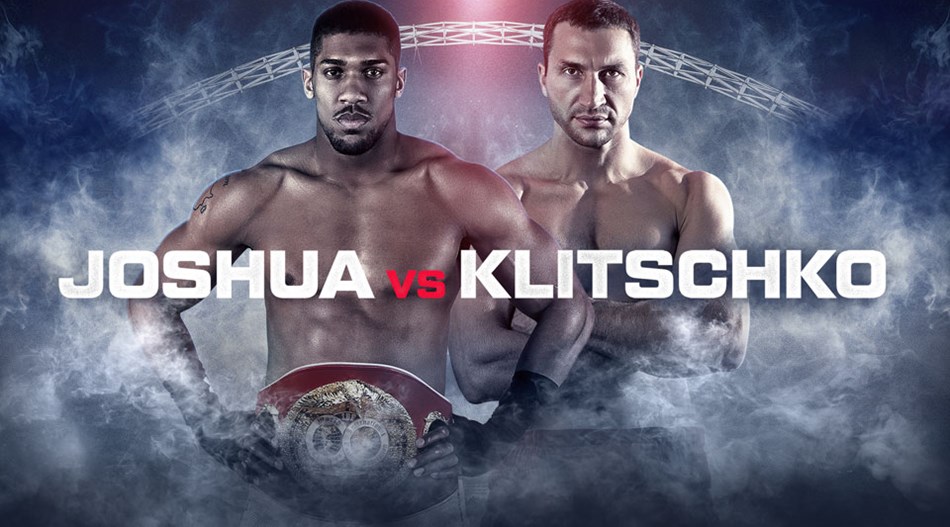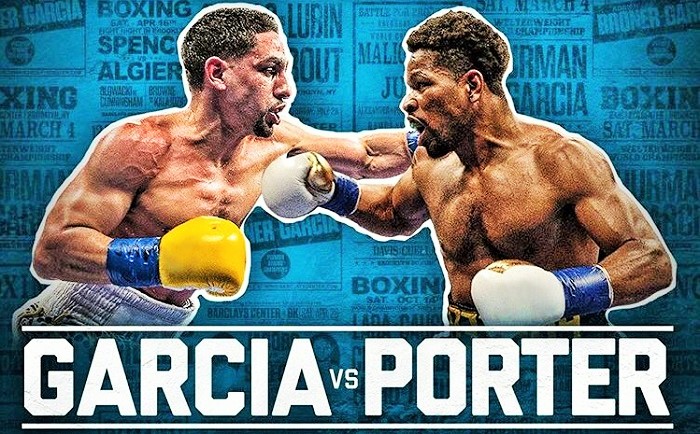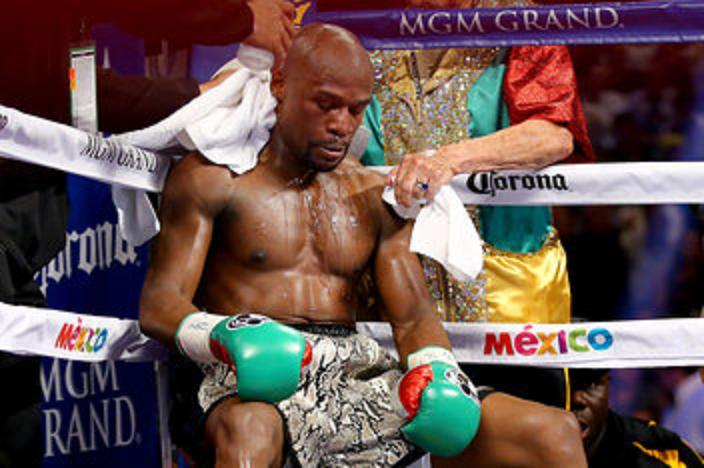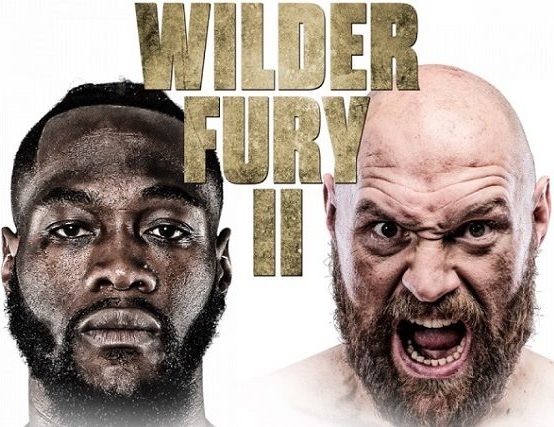Joshua vs Klitschko: It Could Be Cinematic
The narrative has never been easier. This Saturday, London’s Anthony Joshua will fight Wladimir Klitschko at Wembley Stadium for a triumvirate of heavyweight titles. He will draw over 90,000 fans to the second largest stadium in Europe, which is an apt metaphor, both for the British champion’s size and the clout he commands as the sport’s new juggernaut. That Joshua will look to usurp his mentor, a man who once made 21 consecutive title defenses and speaks in pregnant sentences befitting his status as a sage, is a poetic subplot, one which should rightfully conclude in a knockout victory ordaining Joshua as boxing’s new king and the United Kingdom as its Camelot. It could be cinematic.
No narrative is free of wrinkles, however. The man Joshua is set to face has not fought since November 2015, when he boxed as though sleepwalking through a nightmare. That night, Klitschko was beaten by Tyson Fury, another Englishman whose career, like Klitschko’s, stalled afterwards, and is now noteworthy only for his outrageous public commentary, Marlon Brando-like weight gain, and as an avatar for people to make knowing statements about mental health best practices. Fury became the lineal heavyweight champion by befuddling a man whose mystique was in some way always traceable to his intelligence, as Klitschko wore a look of wary resignation that night in Germany, and proved incapable of deciphering his opponent’s strange angles. It was a wretched bout that will remain lodged only in the memories of sadists or those intent on privileging MMA over boxing.
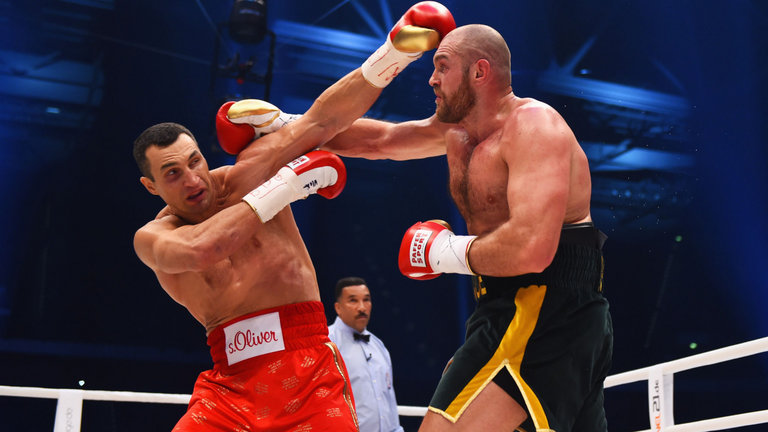
The performance reaffirmed criticisms of Klitschko’s languid style. Like Joshua, the Ukrainian entered professional boxing as an Olympic gold medallist and dynamited his early competition. Then, in his 25th fight he was stopped by Ross Purity; then, in his 42nd he was poleaxed by Corrie Sanders; and then, only two bouts later, Lamon Brewster sent Wladimir to the neurologist in five rounds. Post-Brewster, Klitschko memorably won 22 consecutive fights but recognition of his rule was always begrudging; boxing fans are loathe to lionize a heavyweight champion from a bad era who’s thrice shown himself fallible, and who—rather than depend on his ruinous power—is content to drape himself overtop his opponents, octopus-like, and allow fights to go on longer than his talent would allow if only his mindset were more violent.
Anthony Joshua, who knows Klitschko intimately, having served as his sparring partner in the past, is thirteen years his junior and also an Olympic champion. Joshua’s career has followed an idealized trajectory: from winning a gold medal partly thanks to a questionable decision early in the tournament versus Cuba’s Erislandy Savon, to aligning himself with IFL leading man Eddie Hearn, to wrecking the immediate competition with a definitiveness that induced regular orgasms from Sky Sports mouthpiece Adam Smith, it’s been a boxing fairy tale so far, in which he’s looked impregnable without once being tested (save for the momentary shock he received from Dillian Whyte, whom AJ then almost knocked through the ropes).
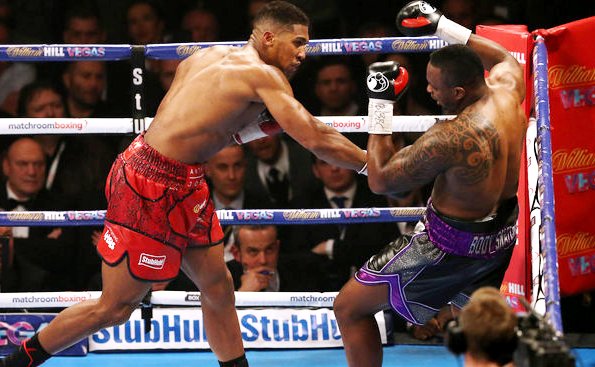
The question of Joshua’s legitimacy is not one he should be faulted for. He is seeking to reign over one of the worst eras in heavyweight history, distinguishable by its hype jobs, aesthetically gruesome Eastern Europeans and converted American football players. There is scant boxing ability to test Joshua against, and that (along with skepticism about how legitimately he came by his physique) is perhaps what fuels anger towards the AJ hype: that he has been given so much, so soon, without having to endure the formative experiences by which men obtain riches in a sport that doesn’t grant free passes.
But if there is little talent in the heavyweight division, Wladimir Klitschko is one of the few who possesses it. In experience, power, and his variety of weapons, he is leagues beyond anyone Joshua has faced. Outside of Luis Ortiz (whose notoriety is mouse-sized compared to his elephantine ability), this is the most hazardous fight for Joshua to make, and outside of Tyson Fury (who must first shed over one third of his current body weight before he steps back into a ring), this scenario is the most financially rewarding. If Joshua wins, it will definitively end Klitschko as a boxing institution and legitimize AJ as a superstar worthy of Eddie Hearn’s feting. If he loses, Joshua can seek a rematch, double his purse, and excuse the loss in any number of ways, as is boxing’s wont whenever an unfavourable result disrupts the long term plan.
Can Joshua win? The answer to this question rests with just how much Klitschko has left. Though he’s 41 years old, it’s not the Ukrainian’s body that engenders doubt, but his mind. While Klitschko has appeared relaxed leading up to this fight (more so than prior to his dance with Fury, when he made this awkward, profane and mildly hilarious denouncement of the Mancunian’s misogyny and homophobia), armchair psychoanalysis is useless because only the fighter knows if he’s prepared. Walking the corridors of one’s mind can be daunting, but if Klitschko is on steady feet he remains a worthy foe.
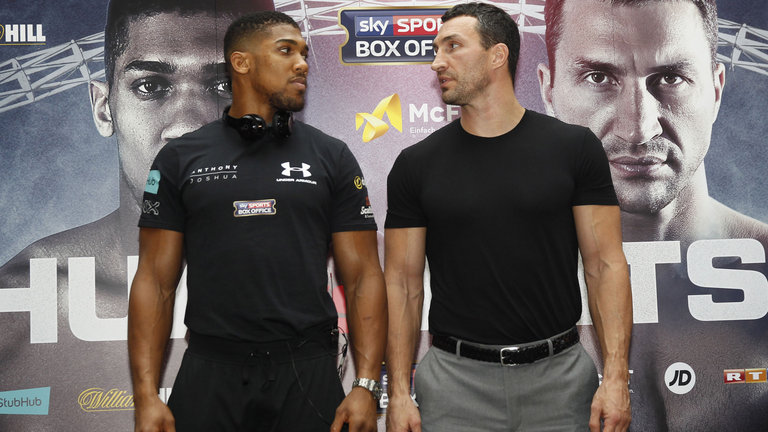
Let us assume, then, that a confident Klitschko enters the ring on Saturday. In such a state, he may be well-equipped to deal with Joshua. Unlike Fury, there is nothing unconventional about AJ beyond his advanced degree of physicality. If Klitschko can establish his jab and turn the fight into a boxing match, jabbing, catching, clinching and pawing his way around an opponent with fast hands but ponderous feet, he has a fine chance of winning. After all, Joshua has never fought anyone with remotely comparable skills (despite, perhaps, Savon), and may struggle to think and pace his way through a cerebral bout. Conversely, if AJ can bully the older man, fomenting the seed of doubt early in the fight, and then, at some opportune moment, torque his body to land a thunderous punch on a notoriously bad chin, Wembley may see a knockout that renders Carl Froch’s conquering of George Groves a distant memory.
It is a fight that pits two supremely large men against one another, both of whom punch with an abundance of power, neither of whom has a reputation for absorbing blows well. For one man, it is an opportunity to prove he still belongs in boxing’s inner sanctum; for the other, it is a chance to corroborate the greatness others have ascribed him. For Great Britain, it is another super fight, whose pomp and spectacle harken to a distant age when the American public still became aroused by such things. And for Tyson Fury, who will perhaps sit ringside at the event, wedged into a narrow seat with his twitter trigger finger ever ready, it may be the impetus he needs to step back into the ring as Joshua’s next opponent, dutifully fulfilling his role in the teleology Eddie Hearn has long envisaged. That narrative, in which the antihero returns to claim his crown, may be the most interesting of all. — Eliott McCormick
https://www.youtube.com/watch?v=hVtQhCrMygI

